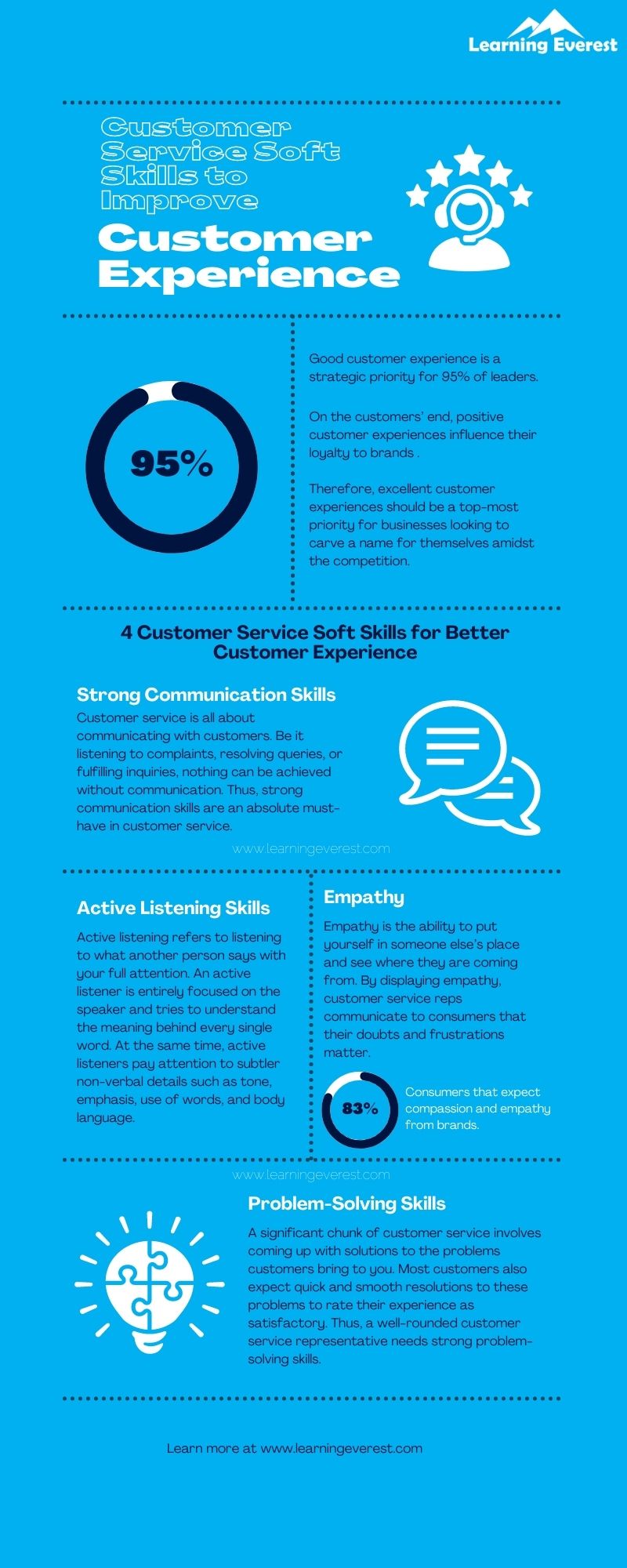Customer service soft skills are an important determinant of customer experience – the thing that ensures customers return to a brand. Thus, for 95% of leaders, good customer experience is a strategic priority and 75% see it as a competitive advantage (Source: Forrester). On the customers’ end, positive customer experiences influence their loyalty to brands (Forbes) and their likelihood to recommend them to someone else (Source: Tempkin Group). Therefore, excellent customer experiences should be a top-most priority for businesses looking to carve a name for themselves amidst the competition. Customer service representatives are often at the frontlines of creating these experiences and need a balanced mix of hard and soft skills to achieve this.
Here are 4 Customer Service Soft Skills to Improve Customer Experience
Customer Service Soft Skill 1 – Strong Communication Skills
Customer service is all about communicating with customers. Be it listening to complaints, resolving queries, or fulfilling inquiries, nothing can be achieved without communication. Thus, strong communication skills are an absolute must-have in customer service.
Communication can be verbal or written and customer service reps typically need to have mastery over both.
Verbal communication skills in a customer service setting include:
- Using short and simple sentences
- Providing cues that you are on the line and listening when the customer is speaking through short interjections
- Repeating important details and explanations
Written communication skills that impact customer experience are similar to verbal communication skills. Messages need to be as brief as possible, cover all details, and include clarifications and explanations when needed. Additionally, you need to provide regular cues that you are present with the customer in the case of communication over chat.
Customer Service Soft Skill 2 – Active Listening Skills
Active listening is another must-have for creating positive customer experiences.
Active listening refers to listening to what another person says with your full attention. An active listener is entirely focused on the speaker and tries to understand the meaning behind every single word. At the same time, active listeners pay attention to subtler non-verbal details such as tone, emphasis, use of words, and body language. Due to this undivided attention of the speaker, active listening helps people gain a deeper understanding of what is being said.
Active listening is a vital customer service soft skill because customers want to be heard when they reach out to a business. According to Salesforce’s State of the Connected Consumer report, about 75% of consumers expect businesses to understand their needs and expectations. Active listening enables this, thereby improving customer experience.
Customer Service Soft Skill 3 – Empathy
Empathy refers to the ability to put yourself in someone else’s place and see where they are coming from. Empathy is expressed using a variety of overt behaviors, but feeling it requires emotional awareness and intelligence.
According to a 2020 Edelman’s Trust Barometer report, 83% of consumers expect compassion and empathy from brands.
While many professions require empathy, why is it an indispensable customer service soft skill? Here are some reasons:
- Customers come to representatives with their problems, dissatisfactions, and grievances
- All customers have different levels of savviness with technology, purchases, and the business itself
- Customers want to feel heard and understood
By practicing and displaying empathy, customer service reps communicate to consumers that their doubts and frustrations matter to the company. Affirming customers in this way elevates their customer experience, captures their brand loyalty, and helps spread awareness about your brand through word of mouth, among other things.
Customer Service Soft Skill 4 – Problem-Solving Skills
A significant chunk of customer service involves coming up with solutions to the problems customers bring to you. Most customers also expect quick and smooth resolutions to these problems to rate their experience as satisfactory. Thus, a well-rounded customer service representative needs strong problem-solving skills.
Problem-solving is a soft skill that includes a variety of cognitive and executive functions that help a person come up with efficient solutions. Some of the core abilities involved in problem-solving are:
- Identifying problems, similarities, and discrepancies
- Gathering and analyzing details
- Creativity
- Brainstorming
- Decision making
One of the easiest ways to hone this customer service soft skill is by learning problem-solving strategies. Additionally, being well-versed with the company’s protocol for resolving different types of requests and complaints is key.
Infographic

4 Customer Service Soft Skills to Improve Customer Experience
Conclusion
Customer service soft skills work together with hard skills such as data entry, product, and industry knowledge, familiarity with calling systems, POS mastery, etc. to greatly boost customer experience. Positive customer experiences are one of the most reliable determinants of customer loyalty. Additionally, satisfied customers are more likely to tell others about your brand. Hence, investing in developing soft skills in customer service personnel through soft skills training will have a big payoff for any business looking to bank on the competitive and strategic advantages of providing positive experiences to customers.
Frequently Asked Questions (FAQs)
What are customer service soft skills?
Customer service soft skills are nontechnical abilities in a customer service rep that influences the quality of customer service they provide. Some of the most important soft skills in customer service are:
- Verbal and written communication
- Listening skills
- Empathy
- Problem-solving skills
Why are soft skills important in customer service?
Soft skills are important in customer service for the following reasons:
- They are a competitive advantage
- They are a strategic priority
- They impact customers’ brand loyalty
- They make customers feel heard and understood
- They help spread brand awareness through word of mouth of existing customers due to their positive experiences with a business





